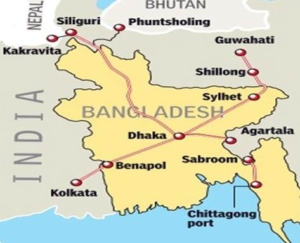In news– Recently, India, Bangladesh and Nepal (except Bhutan) finalized an enabling MoU for implementing the long-gestating BBIN Motor Vehicles Agreement (MVA) that is aimed at boosting regional trade and connectivity.
Key updates-
- Bhutan participated in the meeting as an observer.
- This was the first meeting of the group since the outbreak of the Covid-19 pandemic, and the last meeting was held in New Delhi in February 2020.
- The Asian Development Bank (ADB) provided technical and knowledge support to the meeting.
- The ADB has supported the project as part of its South Asian Subregional Economic Cooperation programme, and has been requested to prioritize about 30 road projects worth billions of dollars.
- In February 2022, the World Bank South Asia programme for BBIN listed projects worth $750 million, for which loans are in “the pipeline”.
About BBIN Motor Vehicles Agreement (MVA)-
- The BBIN Initiative is a sub-regional architecture of countries in Eastern South Asia, a sub-region of South Asia.
- The BBIN Motor Vehicle Agreement for the Regulation of Passenger, Personal and Cargo Vehicular Traffic between the 4 countries was signed during a transport ministers’ meeting in Thimpu on June 15, 2015.
- The BBIN connectivity project was conceived after the SAARC failed to agree on a regional motor vehicles agreement at a summit in Nepal in 2014, mainly because of opposition from Pakistan.
- The BBIN project suffered a setback in 2017 when Bhutan temporarily opted out of it after being unable to get parliamentary approval for the MVA.
- If finalized, the agreement would permit the member states to ply their vehicles in each other’s territory for transportation of cargo and passengers, including third-country transport and personal vehicles.
- As per the agreement each vehicle would require an electronic permit to enter another country’s territory, and border security arrangements between nations’ borders will also remain.
- Cargo vehicles will be able to enter any of the four nations without the need for trans-shipment of goods from one country’s truck to another’s at the border.
- Under the system, cargo vehicles are tracked electronically, permits are issued online and sent electronically to all land ports.
- Vehicles are fitted with an electronic seal that alerts regulators every time the container door is opened.
- The agreement will enter into force after it is ratified by all four member nations and agreement has been ratified by Bangladesh, India and Nepal.

Source: Hindustan Times
















